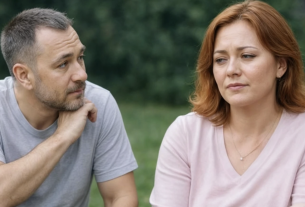“Starting next month, my entire salary will go to my mom. She needs it more.”
The words fell into the kitchen silence as casually as crumbs from the table. Stas didn’t even think it necessary to lift his gaze from his phone screen, which cast a cold bluish light across his serene face. He simply stated the fact, as if announcing the weather forecast or the rising price of buckwheat. Slouched in a chair at the center of their small but spotlessly clean kitchen—kept that way by Veronika—he looked completely alien in that space. He was a visitor from another world, one that consisted only of himself and his mother, while everything else blurred into the background.
Veronika froze mid-movement. Her hand, clutching a damp rag, halted halfway toward the sticky ring left by his cup. She felt warmth dripping out of her fingers, her back muscles turning to stone. Slowly, with mechanical precision, she straightened up and set the rag on the sink’s edge. Her movements were measured, stripped of all fuss, and that in itself was frightening. She stared at the back of her husband’s head, at the way his thumb lazily slid across the phone screen.
“What did you say? Repeat it.”
Her voice was flat and hollow, without a trace of indignation. That dead calm was far more terrifying than any coming storm. Stas finally looked up from his phone, blinking in annoyance as he adjusted to the kitchen light, his eyes filled with faint irritation at being pulled away from something important.
“I said, I’ll be sending money to Mom. My whole salary. You know what her pension’s like. She barely makes ends meet. And we have everything we need.”
He said it with the intonation of someone performing a noble deed, expecting, if not praise, then at least silent approval. He truly didn’t see anything unusual about his decision. For him, it was as natural as breathing. His world revolved around a single axis, and that axis’s name was Irina Konstantinovna. Everything else—his job, his wife, their shared life—were just minor satellites on that orbit.
Something inside Veronika snapped and tore. Not her nerves—something thinner: the last fragile thread holding her patience, her hope, her foolish desire to believe he would someday grow up. Years of him rushing to his mother at the first sneeze. Endless weekends spent fixing her leaking faucet or digging up her garden. Thousands of phone calls reporting his every step. All of it merged into one monstrous lump lodged in her throat.
“She needs it more?” she repeated just as quietly. “She needs it. And we don’t? Our child doesn’t need school supplies? You don’t need new winter boots when yours are falling apart? You already do nothing for this family, you’re like a piece of furniture that occasionally gets carried out to your mother’s. And now you’ve decided we don’t even need your money?”
“Yes! I decided that, because I’m the head here! And enough…”
“You do nothing for this family, you’re always running off to your mother, and now you want to send her your whole paycheck? Maybe you should just go live with her for good?”
She spoke, and he frowned, pouting like a sulky child being deprived of a favorite toy. His face took on the expression she hated most in the world—a mix of stubbornness and total inability to grasp the point.
“Don’t start, okay? You’re never satisfied. I’m taking care of my mother—what’s wrong with that? It’s my duty.”
“Then maybe you should fulfill your duty at its primary location.” Veronika stepped closer. Her usually warm brown eyes were now like two shards of dark glass. “Maybe you should just move in with her. With your things. Permanently.”
Stas snorted and buried himself in his phone again, signaling the discussion was over. His favorite trick—hiding behind the glowing screen.
“I’m not moving anywhere! Stop with the drama.”
Veronika gave a bitter smile, twisted and ugly. She no longer felt anger or hurt—only a cold, ringing emptiness and a sudden, crystal-clear understanding of what needed to be done.
“You don’t get a choice. I’m not asking. I’m informing you of my decision. You’re moving out. Today. Go crawl back under your mother’s skirt. She needs you more—both you and your paycheck. The door’s right there. Start packing.”
Stas slowly put his phone down, as if it had grown too heavy. His face showed puzzled superiority, like someone listening to a lunatic and wondering whether it was worth responding. He looked at Veronika’s straight back, her hands locked tightly together, and smirked.
“Are you serious? Nika, cut the act. PMS, or what? I said I’ll help my mom. My mom. My only family, who’s given her whole life to me. And you’re making a scene over that?”
He got up, intending to brush past her into the next room, to demonstrate just how insignificant her words were. But she didn’t budge. She stood in the narrow passage between the table and the fridge like a stone pillar—an immovable border between his past and his future.
“Your only family?” she repeated, her voice devoid of warmth. “And what am I to you? A maid? An incubator for your son? A handy life accessory you can ignore as long as it functions? Have you ever once asked what I need? What your child needs? Have you once, in the past year, spent a weekend with us instead of at her dacha propping up her rotten fence?”
The accusations rained down like sharp, dry seeds. He instinctively stepped back, unprepared for this version of her. Usually she sulked and gave in. Now a stranger stood before him, her eyes cold and resolute.
“What nonsense are you spouting? That’s not true! I work, I bring money to the house! You’re not lacking anything!”
“Money?” She let out a short, dry laugh. “You think your role in this family is just to bring home a paycheck? And now you won’t even do that. Do you know the difference between us, Stas? I build this home. Every day. I cook, clean, wash, help with homework, plan what we’ll eat tomorrow, what our child will wear the day after. And you? You just sleep here. You’re a guest. A consumer. And now this consumer has decided he won’t pay for services anymore. Well, the services stop here. Pack your things.”
His face flushed crimson. Accusations of uselessness hit his sorest spot. He whipped out his phone like a knight unsheathing his sword—his main weapon, his hotline to headquarters.
“Oh yeah? Fine. I’ll call my mom. We’ll see what she says about how you treat her son. About how you appreciate my care for her.”
Veronika silently stepped aside, arms crossed, leaning against the counter, watching him with disdain—like someone spotting a cockroach on a spotless floor.
He dialed. His posture shrank, voice turning whiny, childlike.
“Mom? Hi… No, not okay. It’s Veronika… Yeah, again. Imagine—I told her I’d help you, send you money… And guess what? She’s throwing me out! Told me to move in with you! Straight up! Said I don’t do anything for the family… Mom, that’s not true, right?”
As he listened, his stance shifted. His shoulders squared, chin lifted. The whine gave way to firmness, to borrowed confidence. He nodded, soaking in his mother’s righteous fury.
“Yes, Mom… You’re right… Of course… I’ll do as you say. I’ll put her in her place. Okay. Love you.”
He hung up, triumphant. The meek boy of five minutes ago was gone; before her stood a smug puppet stuffed with someone else’s will.
“Well. I spoke with Mom. She says I’m absolutely right, and I need to be firm. So listen up: I’m not leaving this house. This apartment is as much mine as yours. I’ll help my mother as much as I see fit. If you don’t like it, deal with it. Because I’ve decided. I’m the man of this house, and things will be as I say.”
Veronika just stared at him, like an entomologist at a pinned insect. His phrase “man of the house” had as much truth as a cardboard sword in a child’s hands. He waited for a fight, for a reaction, but her icy silence enraged him more than shouting. Finally, he slunk into the living room and blasted the TV.
The hours that followed were filled with thick, suffocating silence. Veronika moved quietly around the kitchen, finishing chores with mechanical precision. Their son was at her parents’—a blessing. He didn’t need to witness this absurd theater.
Then came the doorbell—short, sharp, impatient. Not a guest’s ring, but an inspector’s. Stas, thrilled for reinforcements, rushed to open it.
On the threshold stood Irina Konstantinovna. Not a frail pensioner in need of help, but a monolith in a fine wool coat, with a perfectly styled coiffure and the face of a Roman senator. She entered without glancing at her son, striding straight to the living room like a general arriving at the front line.
“So, son, did you explain this woman’s place to her?” she began, deliberately refusing to acknowledge Veronika, as though she were furniture.
Veronika stepped into the doorway, leaning against the frame, arms crossed.
“Hello, Irina Konstantinovna. You’re in my home. And before you lecture me about my place, take off your coat and shoes.”
Irina turned her head slowly, her face betraying neither surprise nor anger—only cold, haughty curiosity.
“I didn’t come here as a guest, child, but to save my son’s family from your selfishness. Stas told me everything. How dare you throw him out of his own home just for wanting to help his sick mother?”
“First, I’m not a ‘child.’ Second, your so-called sickness doesn’t stop you from looking immaculate and marching across town. Third, he didn’t ‘help’—he decided to abandon his financial responsibility to his own family. To me and your grandson. Do you not see the difference?”
Stas jumped in loyally from behind his mother.
“Nika, stop it! Mom’s right! You just don’t want me helping her! You’ve always disliked her!”
Irina smiled triumphantly, running a gloved finger along a shelf without even looking at it.
“I always told my boy that a wife should be support and comfort. She must understand that a mother is sacred. But you—you only think of yourself. Of comfort. Of money. A real woman makes a cozy home, not count her husband’s pennies when he wants to give them to the one who gave him life.”
“Cozy home?” Veronika swept her gaze across her spotless apartment. “Cozy is when your husband comes home to be with you, not to hide before running back to his mother. Cozy is when you plan a future together, not when he announces you have no place in it. You came here to support him? Fine. Support him—just at another address.”
She straightened, eyes steady. In front of her were not two people but one two-headed organism, bound by an uncut umbilical cord. They both stared at her with mirrored righteous fury, certain of victory. But for Veronika, words were done. Time for talk was over.
“Well? Do you understand now?” Irina’s voice dripped triumph as she looked down at Veronika despite being shorter. “My son is a man. He will care for his mother. And you must accept it. You should be glad to have such a caring husband.”
Stas puffed up, emboldened.
“Hear that? Mom knows best. So cut the act. I’m hungry. Make dinner.”
Veronika studied their smug, unified faces. They were one monument of mother-son devotion. And in that moment, she felt not rage, not despair, but pure, crystalline calm. The calm of a surgeon delivering a final diagnosis: the tumor is inoperable, amputation required.
Without a word, she turned and walked to the bedroom.
“That’s right,” Irina called after her. “Go cool off. It’s about time you learned who’s in charge.”
Stas smirked, settling toward the TV, confident in victory. She’d cry into a pillow, then return meek and obedient. Always had.
But she didn’t return. Instead, the sound of the wardrobe opening came from the bedroom. A minute later Veronika reappeared with a large, dusty sports bag—the one Stas had brought when he first moved in, naively thinking he was starting a new adult life.
Both he and his mother gaped.
“Where are you going?” Stas asked with smugness.
Veronika gave no answer. She marched to the hall, threw the bag down, yanked open the closet, and began shoving his coats, scarves, and hats into it with brutal precision.
“What are you doing? Are you crazy? Put that back!”
“Stop this hysteria at once!” shrieked Irina, her senatorial composure cracking. “Veronika, I forbid you!”
But Veronika didn’t hear them. She was deaf to their voices. She stormed back to the bedroom, yanking open drawers, flinging his shirts, sweaters, underwear into the bag. She wasn’t packing—she was eradicating, exorcising his parasitic presence from her home.
“Nika! Stop! Those are my things!” Stas shouted, grabbing helplessly at the air.
She kept working silently, relentlessly, until the last pair of socks flew into the bag. She yanked the zipper shut with a sound like a gunshot.
Dragging the swollen bag to the front door, she flung it onto the landing. It hit the tiles with a dull thud.
Only then did she turn. Her eyes swept over them both—nothing but cold fact in her gaze.
“That’s it. Get out and never come back. There’s your paycheck, there’s your pension. Together. Done.”
She looked directly at Stas, but her words were meant for them both. The fridge hummed in the silence. Irina’s face twisted in rage, her mouth opening but finding no words. Stas stood pale, bewildered, childlike, unable to grasp how his triumph had flipped into total exile.
Veronika stepped back inside and reached for the door handle.
“The door’s there. Take your belongings and leave. Both of you.”



